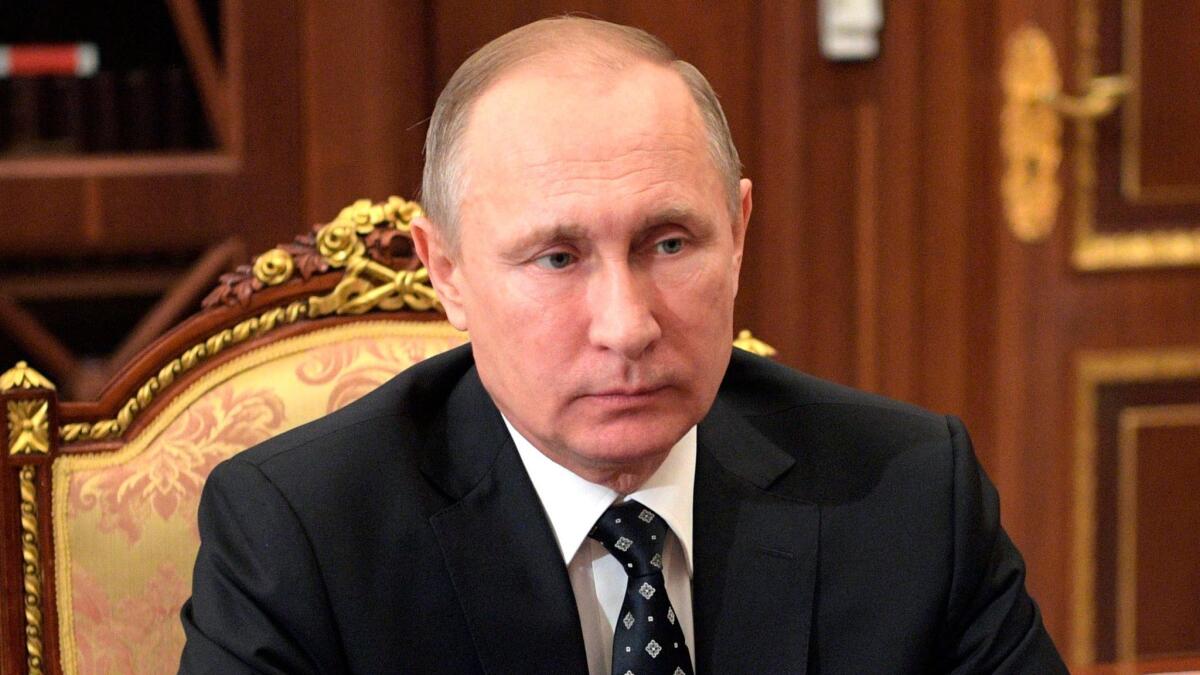Column: A ‘good relationship’ with Russia shouldn’t be Trump’s priority

Russian President Vladimir Putin attends a meeting in the Kremlin in Moscow on Jan. 10.
Donald Trump is right. (I’ve been waiting weeks for a chance to write that.)
“Having a good relationship with Russia is a good thing, not a bad thing,” the president-elect tweeted last weekend. “Only ‘stupid’ people, or fools, would think that it is bad!”
That’s true; no sensible person wants a state of hostility with a nuclear superpower.
But – and you knew a “but” was coming – Trump tweeted his foreign policy doctrine with an essential piece missing. The goal of American foreign policy is to protect U.S. interests, not to achieve “a good relationship” with any particular country – much less a country as troubling in its conduct as Vladimir Putin’s Russia.
Trump hasn’t given a full-scale foreign policy speech since April, when he unveiled his “America First” slogan. He did, however, suggest during the campaign that he would focus on a few core goals:
Defeating Islamic State and other terrorist groups.
Negotiating better trade deals to bring jobs back to the United States.
Curbing Iran’s power in the Middle East, and canceling or renegotiating President Obama’s nuclear deal.
Putin’s goals conflict with U.S. interests more often than they coincide.
Renegotiating the NATO alliance to force other countries to spend more on their own defense – with a warning that the U.S. might not defend them against Russia if they don’t.
Here’s the problem with Trump’s bromance with Putin:
Of the four items on that list, the Russian leader might be helpful with one, the fight against Islamic terrorists. He’s not so interested in the others.
Bringing U.S. jobs back? Not his problem.
Curbing Iran and scrapping the nuclear deal? Actually, Putin’s proud of the role he played in negotiating the agreement, and he’s been busy selling advanced weapons to the ayatollahs.
Renegotiating NATO? Putin may want to encourage Trump on that one – but mostly to see if he can undermine the Western alliance.
Putin’s priorities are different from ours. He wants to stay in power and stave off what he sees as Western pressure to democratize. He wants to restore Russia’s sphere of influence over the countries of the former Soviet Union, beginning with Ukraine, which he invaded in 2014. He wants to weaken the North Atlantic Treaty Organization, which he views as a hostile military alliance.
In other words, Putin’s goals conflict with U.S. interests more often than they coincide.
In addition, Russia experts believe Putin actually prefers to cast the United States as an adversary, because it helps him maintain his hold on power.
“The legitimacy of Putin’s system of repressive domestic controls depends on the existence of external threats,” William J. Burns, a former U.S. ambassador to Moscow, wrote last week. “If he can’t easily build Russia up, he can take the United States down a few pegs with his characteristic tactical agility and his willingness to play rough and take risks.”
Republicans – including the ones inside the new Trump administration – are divided over how much U.S.-Russian cooperation is feasible.
Trump’s nominees as secretary of Defense (James Mattis), CIA chief (Mike Pompeo) and national intelligence director (Dan Coats) have all described Putin as an adversary, not a friend.
Meanwhile, retired Lt. Gen. Michael Flynn, Trump’s choice as national security advisor, has long argued that an alliance with Russia is key to defeating Islamic terrorism. “We can’t do what we want to do unless we work with Russia, period,” he said last year.
And Trump’s top political strategist, Stephen K. Bannon, has said he thinks Putin can be enlisted in a joint effort to contain the growing power of both Iran and China.
Trump has already proposed a way to settle the question: Just give Putin a chance.
“Some say the Russians won’t be reasonable; I intend to find out,” he said in April. “If we can’t make a good deal for America, then we will quickly walk from the table.”
But he still needs to define what a good deal would be.
Here are three specific steps Trump should take:
First, he should reassure U.S. allies that he doesn’t plan to walk away from NATO treaty commitments. (The three small Baltic states, which feel directly threatened by Russia, are already racing to meet their commitments on defense spending.)
Second, Trump should announce that he won’t support any relaxation of Western sanctions against Russia unless Putin withdraws from eastern Ukraine. Former U.S. envoy Stephen Sestanovich says the Russians are waiting to see if Trump will act without asking for anything in return. “The other side never pays for something it expects to get for free,” he wrote.
Third, the president-elect should wait for the 90-day review of cybersecurity he’s requested before tweaking any of the Obama administration’s added cybersanctions. Until now, he’s treated questions about Russian hacking as political attacks on his legitimacy; once he’s safely in office, he might be able to consider them more calmly as a question of U.S. security interests.
Trump should take his own advice: Deal with Putin from a position of strength, not weakness – and seek good relations only in pursuit of a “good deal,” not as an end in themselves.
Twitter: @DoyleMcManus
Follow the Opinion section on Twitter @latimesopinion and Facebook
ALSO
Did Latino voters actually turn out for Trump in the election? Not really
Why Ferris Bueller is our everyman
At the Sessions hearing, the business of government is ... hysteria
More to Read
A cure for the common opinion
Get thought-provoking perspectives with our weekly newsletter.
You may occasionally receive promotional content from the Los Angeles Times.











